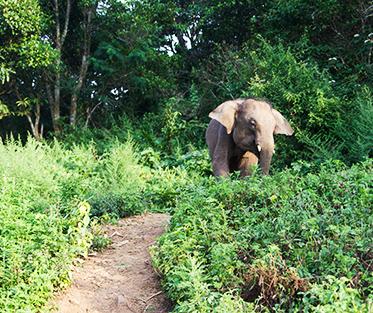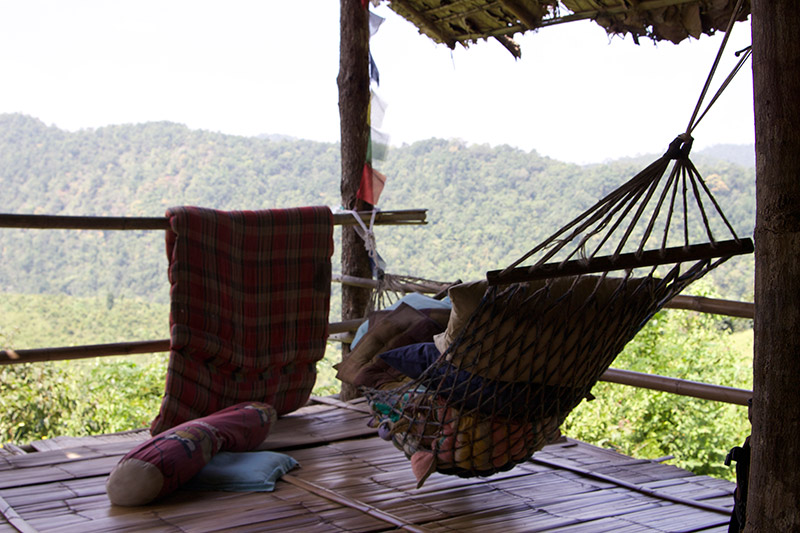Staff Interview with Dee Drinya Totrakool
Get to know GVI's staff!

Dee works as GVI’s Thailand Country Director. Prior to joining GVI she worked for other volunteer organizations and has specifically worked in the voluntourism industry in Thailand for almost eight years already. Dee oversees all GVI Projects based in Thailand, which proves to be both a demanding and rewarding experience each day.

Why does a volunteer join Global Vision International (GVI) program in Thailand?
Well, it’s a big market. I would say there are so many volunteer orgs in Thailand offering the same programs. From my experience, talking to our volunteers, they are looking for something a bit more, different. They want to travel, they want to get an authentic experience, something a bit beyond any touristic experience. To experience the place, the people and the culture. The fact that GVI operates our own projects makes us stand out among the crowd.
GVI has a wide variety of programs in Thailand, from wildlife and environmental conservation to adventure and community development. What is the most interesting project or placement?
I cannot really say the most interesting project because everyone has different interests. It’s very subjective. We have teaching children, for people who want to work directly with children would sign up for things like that, or people who want to do the tefl course, and also health care. We work with disabled children and also conservation programs. To me, its really what you want to get out from your experience.
What is the most important thing participants should know about Thailand before participating in your program?
Everyone that signs up with GVI Thailand they all start for wanting something experience. I think they truly understand and prep themselves before they come, to be facing with a big challenge with language barrier. So maybe they might have thought at home before that it’s not easier. In Thailand, its going to be even harder with the language barrier. In Thailand, you're not going to be able to see the progress as quickly as you want to see, it’s a slow progress, but it’s still a progress.
So to me they just have to understand what they sign up for. Sometimes they come and want to get so much they forget that the language is a big thing and they get frustrated. It takes time. So I think language barrier is a big thing...but you can always find a way to work around it.
If there is one thing that a volunteer should bring, what is it?
I get asked this question a lot. I would say to bring your patience here. Always remember why you signed up for Thailand program, because you want something different. So everything about this experience is going to push you out of your comfort zone, the living conditions, the change of dietary, and also language barrier. You will be out of your comfort zone, so to really to be able to cruise through this you really need to have a positive mind set and to be patient to go through this. It will take time, once you find that rhythm you will be okay.

A beautiful landscape view of Chiang Mai's mountains in a relaxing hammock. Photo by Carter Brown
Conversely, what is one thing students or volunteers should leave at home?
I would say just leave home that “home mindset”. I mean the clock is still ticking here, we still get things done here in Thailand, but we just have a different way of doing it.
For example, we work with villagers so it’s best to operate on village time. We still get things done, but maybe it’s not exactly how you can get things moving forward like at home. I think they just need to understand that it's part of being out of the comfort zone, finding a new rhythm and routine, and settling into that rhythm.
How do you help volunteers understand the local culture?
We try to put together really good programs, and we are constantly improving the programs we are doing, apart from just offering a good learning experience of teaching children, TEFL, or conservation projects. The project activity might be working with animals, but along the line we try to put together project activities that will enhance the local experience to help the participant understand better about their new living environment. We try to facilitate the learning experience and bridge the gap for them.
Personally, if I'm at a project, I set up a learning opportunity by taking them to a temple if there are any special buddhist events going on, or take them to the temple and explain what is going on, or even take them to the local market. Things like this. It doesn't cost any extra money, we can just take them and explain to them. To me it is part of traveling to Thailand.
What is a typical day like for a volunteer in your program?
In the elephant project they start pretty early because we trek in the forest to follow and track down the elephants and observe the elephant. Start early, they get up at like 6 or 6:30 am, they get a prep safety talk, and debrief and after that.
About 7 they go into the forest and spend, it depends on how far the elephants are because some days they might have to trek quite far, maybe two hours to get to see the elephants and spend an hour or two hours in the forest observing the elephants foraging.
After that, cooking in the forest with the mahout, learning basic, simple skills like how to cook in the forest. In the afternoon, they might be doing some kind of local thing, like attend local project activity like basket weaving.
In the evening they might cook with villagers, and after dinner most of the night they will have special activities organized, like quiz night, game night, watching documentaries, some things like that. It really depends on the project.
Traveling may involve a bit of risk, from accidents to the possibility of illness. How do you ensure the safety of your volunteers?
Well, I think GVI takes safety as number one priority, so we always prep our volunteers. We meet them at the accommodation, we give them an orientation: on GVI, about the program, and we go over the risk assessment form with them. We do a safety talk with them in order to get everyone on the same page.
Aside from the actual experience, what is the most important thing you want participants to bring home with them from your program?
I think it really depends, they get out what they put in. To me, if you can put a really good program together, what they can bring home apart from the experience is the new. If you can facilitate a really good learning experience for them, they can take home with them a new set of outlook on life, to appreciate small things that they have at home, things that we take for granted, and also appreciate what they have in the village.
To me, if that person comes on a program with an open mind one can learn a lot about the program, but what is beyond that, you can learn a lot more about yourself, who you are, and who you want to be. I think that is the biggest thing you can take home.
What brought you to GVI Thailand?
I was looking for something more challenging. I had been working in voluntourism industry for 7 years now and I was comfortable with my previous job, but I stopped growing. I think the only person in my way was myself. I don't want to get too comfortable in my job. I need to push myself out of my comfort zone and challenge myself with something bigger, because every struggle, every difficulty that I will be faced with, I can always look back and realize that I have been there and done that. That is what brought me to GVI.
What makes GVI unique among volunteer providers in Thailand?
Because I have been in this industry for seven years now, it is safe to say that I know the voluntourism market in Thailand very well. Most of the volunteering organizations that I have come across in Thailand, including my previous employer, it’s more of a sign-up industry.
When I first came to GVI it was extremely difficult, because GVI operate their own projects so there is a lot more detail to get things set up behind the scene, in order to have a smooth operation for the volunteer. To be able to work directly with villagers, to see directly where volunteers money is going, and be with a really good facilitator, you could get a lot out of the project. I think this is what GVI is trying to do globally. It’s very grass root and there is a lot of room for improvement, but that is the nature of grass root projects.






